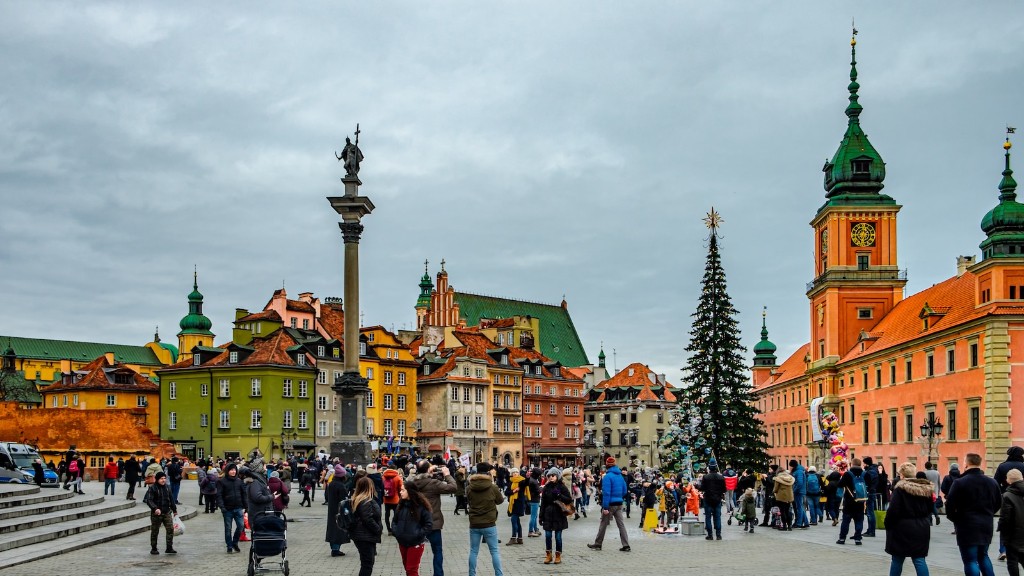Poland has long moved away from its Soviet-dominated past, but could the country withstand an attack from Russia on their border? ever since its accession to NATO in 1999, Poland has placed considerable importance on political and military security. That being said, the question of whether or not Poland could effectively defend itself against a full-scale invasion by Russian forces is a complex one.
There are a number of factors to consider when evaluating this perplexing predicament. To begin with, one should consider the Russian military; it is an immensely powerful force. Russia’s current military budget is recorded to be $66.3 billion, which makes it the fifth most powerful military in the world. In addition, there are over 700,000 active-duty soldiers in the Russian armed forces. This scale of resources and personnel means that defending against a full-scale invasion by Russia would be almost impossible for Poland.
In addition, the physical size of the two countries should be taken into account. Russia is over 10 times the size of Poland in terms of landmass, so the possibility of defending against its larger forces would be pretty slim. With its immense territory and powerful military, it would be relatively easy for Russia to conquer any part of Poland.
Apart from the sheer size and power of its military, another factor to consider is Russia’s potential for strategic surprise. The country has repeatedly demonstrated its capabilities in this area, most notably in its involvement in the Ukraine crisis in 2014. The rapidity of the invasion and the seeming ease with which Russian forces were able to seize control of the Crimea region was astoundingly effective.
Moreover, when looking at the current political context, the possibility of Russia successfully invading Poland is even greater, as the country is perceived as “weak” by its neighbour. In addition, the presence of US troops on Polish soil, mentioned in its obligation to NATO’s Article V, are largely proven ineffective in defending against a full-scale attack.
Finally, one should also take into account Russia’s nuclear capabilities. With around 7,000 nuclear weapons in its possession, the country has the firepower to destroy any of its adversaries. Therefore, its potential for nuclear warfare should not be underestimated.
Overall, it appears that it may be difficult for Poland to defend itself against a full-scale Russian invasion. The sheer size and power of the Russian military, potential for strategic surprise, and nuclear capabilities are all major factors that should be taken into consideration when addressing this question.
Russian Nuclear Arms
Russia’s immense arsenal of nuclear weapons further contribute to its immense power. Russia has the world’s 2nd largest nuclear arsenal with at least 7,000 nuclear warheads. This arsenal includes a mixture of missile- delivered, air-delivered, and sea-launched nuclear weapons. This formidable nuclear deterrent is one of the chief reasons why Russia has been so successful in its invasions in the past. Its potential for nuclear warfare should not be underestimated and it must be assumed that they would use this destructive capability if they were to invade Poland.
Russia’s nuclear weapons not only give it offensive capabilities but its huge nuclear arsenal also provide a certain degree of defensive protection from the possibility of external attack. This knowledge of the destructive power that Russia possesses can be a powerful deterrent against any possible invasion of Polish territory.
Despite the fact that Russia’s nuclear weapons are still somewhat regulated by the international arms control treaties, Russia has still been working feverishly to modernize its nuclear arsenal. The country has been actively engaged in the upgrade of its nuclear weapon delivery systems, the development and deployment of new warhead types, and the pursuit of new types of nuclear weapons such as hypersonic missiles and nuclear cruise missiles.
Russia has also been developing high-precision low-yield nuclear weapons that would reduce the risk of nuclear escalation in the event of any potential attack on Polish soil. These weapons would enable Russia to accurately target restricted strategic targets without the need to employ a full-scale nuclear attack, making them a dangerous and effective tool of warfare.
NATO Military Response
Fortunately, Poland does have a powerful ally in the form of NATO. The military alliance between the North Atlantic Treaty Organization and the Republic of Poland serves as an effective deterrence against Russia as well as a potential means of collective military defense. NATO gives Poland access to sophisticated armed forces as well as strategic intelligence to detect and respond to any potential invasion by the Russian forces.
NATO has also established two bases in Poland as part of its Enhanced Forward Presence program. The two bases are stationed in Orzysz and Drawsko Pomorskie and consist of over four thousand soldiers from the US, UK, Romania and Croatia, amongst other countries. These bases act as a powerful deterrent against any kind of Russian aggression.
Additionally, NATO’s Air-policing actions have been highly successful in maintaining the security of Poland’s airspace. The alliance has been policing NATO airspace over the Baltic region since 2004 and is a crucial part of Poland’s air defense. In 2014, this air-policing air-space was extended to cover the entire airspace of Poland.
The North Atlantic Treaty Organization also provides Poland with a wide range of military training initiatives. These training initiatives range from basic military drills to exercises in combined maneuvers in order to improve the security of the country as well as the operational capability of the Poland forces.
Overall, the presence of NATO in the region provides Poland with a relative sense of security against any potential invasion by Russian forces. The military alliance offers a powerful example of collective defense and demonstrates the solidarity of the nations of Europe in the face of Russian aggression.
Political Context
The political context of the current situation between Poland and Russia must also be taken into account. Since the end of the Cold War, there has been a tense relationship between the two countries, fuelled by Russian aggression in Ukraine and its opposition to the NATO alliance. This tension has served as a powerful motivation for Russia to engage in limited military action against Poland.
In recent years, Russia has become increasingly bold in its actions against its neighbours. It has been constantly making provocative statements and actions, such as sending nuclear-capable Iskander tactical missiles to the Russian regions bordering Poland. This action was interpreted by many as Russia’s way of threatening Poland with potential nuclear attack were it to oppose Kremlin’s interests.
As a result of this hostile attitude, Poland has constantly been at the forefront of NATO’s defence and political efforts. This has only served to further enrage the Kremlin, further intensifying the tensions between the two nations.
Overall, it is clear that the political context between the two countries is one of animosity, which can only add to the perceived threats of Russian invasion. This hostile political context must be taken into account when assessing the potential of Poland being able to defend itself against a full-scale Russian invasion.
Conclusion
In conclusion, it appears that it would be very difficult for Poland to effectively defend itself against a full-scale invasion by Russia. While its NATO allies provide an effective deterrent against any potential Russian military action, the sheer size and power of the Russian military, combined with its nuclear capabilities, make successful defense highly unlikely. Furthermore, the current political context between the two countries has only served to increase the menace of Russian aggression, making defense even more difficult.





